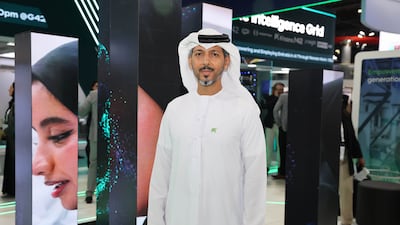Abu Dhabi's Khazna Data Centres, one of the industry's largest operators in the Middle East, will be building a 100-megawatt data centre in Ajman, which will be its biggest in the Emirates, the company said on Monday.
Khazna is expecting data centre capacity in the UAE to nearly double to 850 megawatts by 2029 as it aims to capitalise on growing demand, its chief executive Hassan Al Naqbi told The National in an interview on the sidelines of the Gitex Global technology conference in Dubai.
The 360MW capacity that the company currently has highlights its continued investment in the sector, he said.
The new Ajman facility, which is expected to be operational by the third quarter of 2025, is “unique” and designed for artificial intelligence-ready applications, Mr Al Naqbi said. It is part of series of launches as two more data centres, each with a capacity of 30 megawatts, are to be announced “in the next few weeks”, he added.
While he did not disclose the cost of the data centres, he hinted that the average value of construction per megawatt is “between $8 million and $12 million”.
Khazna, a unit of Abu Dhabi AI major G42, currently has 24 live data centres in the UAE and eight under construction, helping it to corner a market share of about 74 per cent, according to Mr Al Naqbi.
“Based on the demand we have … we expect the UAE to ramp up and accelerate demand to at least 850 megawatts by 2029,” he said.
Remote working trends, largely established in response to the coronavirus pandemic of 2020, have led to increased data consumption fuelling the adoption of cloud services. This has continued to grow in the Middle East because of technology savvy young consumers and an evolving digital landscape, underpinned by governments' efforts to develop the economy.
This has given data centre and cloud providers an incentive to tap into the potential offered by the region. Among the most notable global companies that have invested in the region are Microsoft, Amazon, Oracle, IBM and Alibaba Cloud, which have all opened cloud and data centres.
Khazna manages key infrastructure that hosts critical user data, “liberating businesses to realise their goals and focus on future commerce”, according to its website. It has data centres in Abu Dhabi, Al Ain and Dubai.
Within the Middle East and North Africa, Khazna is in the final stages of identifying the land on which a $250 million data centre will be built in Egypt, which is expected to be completed by 2026, and is in advanced stages in constructing another in Saudi Arabia, the Arab world's biggest economy, Mr Al Naqbi said.
In May, G42 announced that it will build a geothermal energy-powered data centre in Kenya in partnership with Microsoft. Talks in Turkey are also at an advanced stage, he added.
In South-East Asia, Khazna is also looking into Malaysia, Indonesia, Thailand, Vietnam and the Philippines – “top of the list”, Mr Al Naqbi told The National in May – as part of an aggressive global expansion.
“We're looking at [several] areas today. We are basically adding a lot of resources to help us navigate and try to explore opportunities,” he said on Monday.
“We try to be a global player, but try to do it in the right way, in the sense that when we enter the market, we make sure that we understand the macroeconomics and which partners we need within that market.”
Khazna will also boost its sustainability efforts, aligning with the UAE's goals of becoming net-zero by 2050, by ensuring all its data centres will be energy efficient and environmentally responsible, Mr Al Naqbi said.
“We have moved away from [using] diesel and reducing carbon emissions. All our facilities have a zero-waste policy … that allows us actually to operate more efficiently as everything has a sustainability element to it,” he said.


